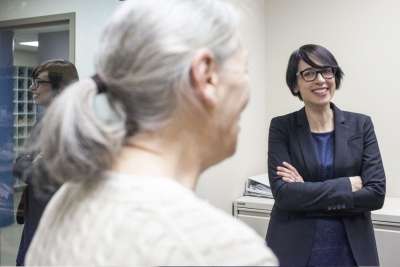Researcher seeks answers to cognitive decline as we age

Aging is not kind to the brain. Memory, for example, begins to fail and multitasking abilities start to deteriorate. But are there ways to slow the natural process of cognitive decline? And if so, how do they work?
It's an area of study that fascinates researcher and psychology professor Julia Spaniol, director of the Memory and Decision Processes (MAD) lab, which is supported by a grant from the Natural Sciences and Engineering Research Council of Canada. In 2014, Spaniol was named a Canada Research Chair (Tier 2) in Cognitive Aging and received an Early Researcher Award from the Ontario Ministry of Research and Innovation.
With her team of master's and PhD students in the Psychological Science stream of graduate program in Psychology, Spaniol examines how cognitive activities, such as attention, memory and decision-making, change across the lifespan. She also studies how motivation, incentives and emotion influence thinking processes in younger and older adults.
In particular, Spaniol is interested in the mechanisms through which cognitive performance can be maintained and maximized in older adults. Her research is extremely timely; people over 65 represent the fastest-growing segment of the Canadian population.
In the MAD lab, researchers ask participants to complete computer-based tests and interview questions and then measure the brain's reactions to specific events using functional magnetic resonance imaging and electroencephalography. Results have shown, for example, that motivational incentives boost older adults' performance on recognition memory tests. Findings such as these suggest that older adults' cognitive performance can be enhanced by activating emotional and motivational circuits.
"When you have goals and are interested in a task, you tend to be motivated to do well," says Spaniol. "We believe that part of the puzzle of cognitive aging is understanding what people find motivating at different ages. How do those motivations influence our thinking, memory, and decision-making? Understanding these links has important implications in motivating people to maximize their potential for cognitive and emotional well-being."
So how do older adults perform when it comes to decision-making, especially when faced with risk or uncertainty? According to Spaniol's research, while some cognitive functions show decline, others actually seem to improve as we get older. As proof, she points to the fact that older adults are often effective decision-makers and sometimes need less information than their younger counterparts in order to arrive at the same good decisions.
Understanding how cognitive processes, such as decision-making, work is critical, says Spaniol. In the future, that knowledge may lead to interventions and training programs that help people to maintain cognitive health well into old age.
"Cognitive decline is going to happen, but it's not set in stone," Spaniol says. "We're shaping our brains all the time and what we choose to do matters, for example in terms of getting enough sleep, being socially engaged and getting exercise. But we still have lots of questions about how we can shape our brains and through what mechanisms we can make that happen."


















